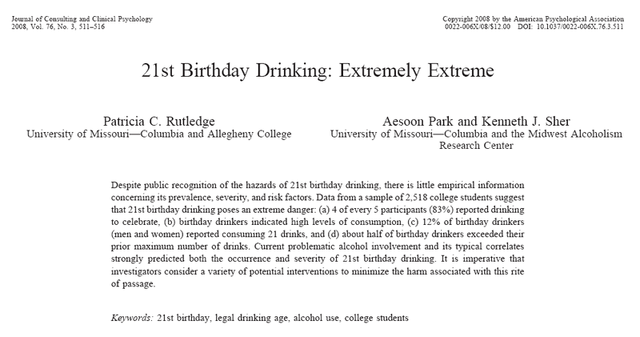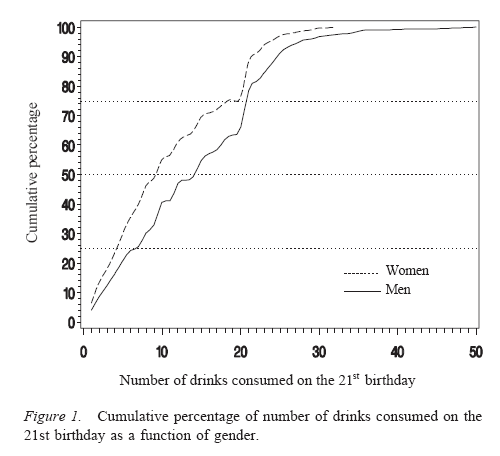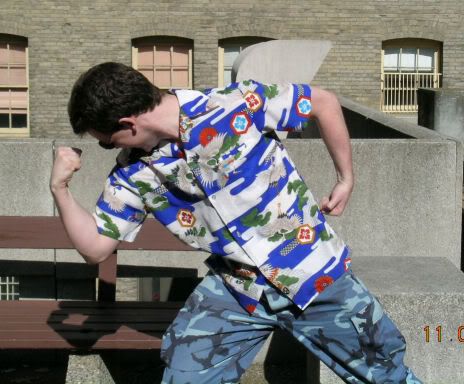Four years. Some people spend that long training for the Olympics, or to govern an country. Apparently it took University of Missouri researchers that long to figure out that students drink on their 21st birthday. I know it's important to make the disadvantaged feel special, Missouri, but that's why we call them "special" - renaming an entire hospital ward for the especially retarded as a "University" is going too far.
Over two and a half thousand students were asked if they drank for their birthday. If any of the researchers felt it they had enough data after the first ten, fifty, hundred, or freakin' thousand people said "Yes!" (or maybe "Yes, duh") they didn't show it. They also seem unaware that any study based on asking students questions and then believing the answers is an utter waste of time.
While it contributes the square root of fuck all to the field it's aiming for, the paper does highlight one of the serious problems in addressing youth drinking. Specifically, those addressing the issue act like aliens who arrived fully formed at fifty with their common sense surgically removed. Don't these people vaguely recall celebrating turning twenty-one? Even assuming they walked under the mental equivalent of a bulk eraser when they turned forty (the same procedure that destroys the ability to understand sexuality, modern music or technology), couldn't one of them made the arduous trek up Mount Basic Reasoning which goes: "The legal drinking age in Missouri is 21. Can we assume that, having turned 21, the person might be keen to try legally drinking?" I don't know, maybe you have to throw a couple of "therefores" and "conjectures" in there before they consider it science.
It is impossible to look at this paper and take it seriously - and they know it.
 "Extremely Extreme"
"Extremely Extreme", Rutledge? Really? See, this is why people don't take scientists seriously, it's because of shit like this. For every hundred heroes working to cure cancer or generate fusion power there's some idiot trying to act hip. We don't need to be fucking hip, lady, when we figure out how to eliminate AIDS people will not refuse to get treated because we don't use the correct slang.
"
Despite public recognition of the hazards of 21st birthday drinking, there is little empirical information concerning its prevalence, severity, and risk factors." Yes, there's a reason for that! Translation "
This be shit what people already knew, and therefore did not need to waste time and energy studying." They are actually admitting that their study is worthless and crowing over how they found a justification to get funding for it anyway.
There's little empirical evidence that slamming yourself in the head with a sledgehammer is bad for your health either! I mean, sure, everybody on the fucking planet already knows it and the times it's actually happened have provided absolute proof, but it's just as valid as this paper. Why not conduct a few trials and submit to the Journal of Blunt Trauma Studies? I can guarantee you won't have to keep it up for a whole leap year before you start seeing some real results and, for once, actually advance the field of science (if only by removing yourself from it).
I'm afraid that top-right corner isn't faked either. This six-page ode to the excruciatingly obvious has been peer reviewed and published in a respected psychological journal. Hey, psychology, Scientology says you're just a bunch of faking hacks and while that might be the most pot-kettlingest thing ever in recorded history, shit like this really doesn't help your side. If I have to choose between refereed proceedings on whether students drink or insane alien gods hiding in volcanoes, at least the latter required a bit of work to come up with and has explosions.
They top off this assault on science with the most horrifically misleading graph ever.

Who, ever, anywhere has ever graphed two values by cumulative percentage on the y-axis? When you want to show how many people drank a certain number of drinks, you put that number on the Y-axis - that's how graphs fucking work! That's the whole point, a clear representation of the relation between a two variables! The only conceivable reason to use cumulative values is to mislead the fuck out of the audience and give a super-duper steep climb to a screaming 100% at fifty drinks, and women drink more than men - surely our precious children are drowning in filthy rivers of liqour! Despite the fact that's the EXACT OPPOSITE of what this data shows! Despite the fact that any cumulative graph will climb like that - ANY study has 100% of its own participants, that's what 100%
fucking means. The authors are genuinely hoping that their own readers will be too dumb to figure out this con a 419 scammer would dismiss as "too obviously fake and retarded." Goddammit, Rutledge, how can you sign off on this image and even pretend to be an academic - couldn't they find a red nose and big floppy shoes in your size down at the circus tent?
Likely Errors: 0%, another successful use of the "Study something everybody already knows for a fact" error-avoidance strategy.
What they could have spent the money on: It's only hard to think how the money could have been spent worse. Literally anything would have provided more benefit to the world than this study. Want to buy a thousand commemorative Elvis plates, load them onto a catapult and fling them at a bulldozer? Well, dammit, at least that hasn't been done before and we'll get a YouTube clip out of it.
Physorg article on the original research


